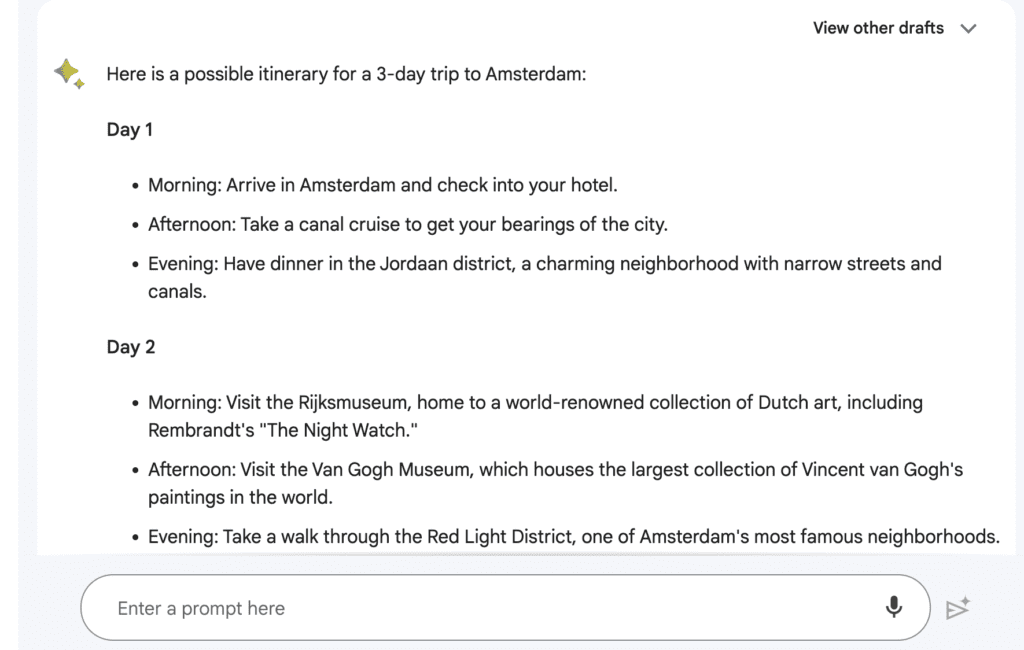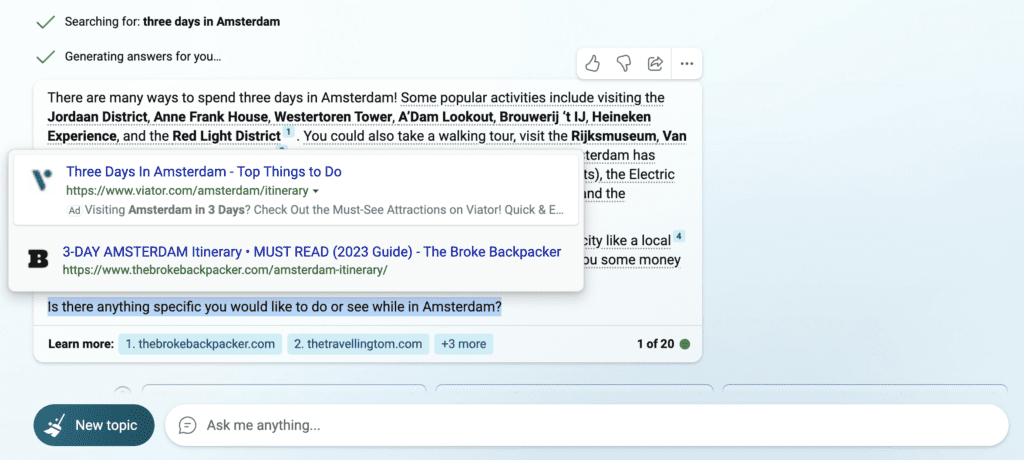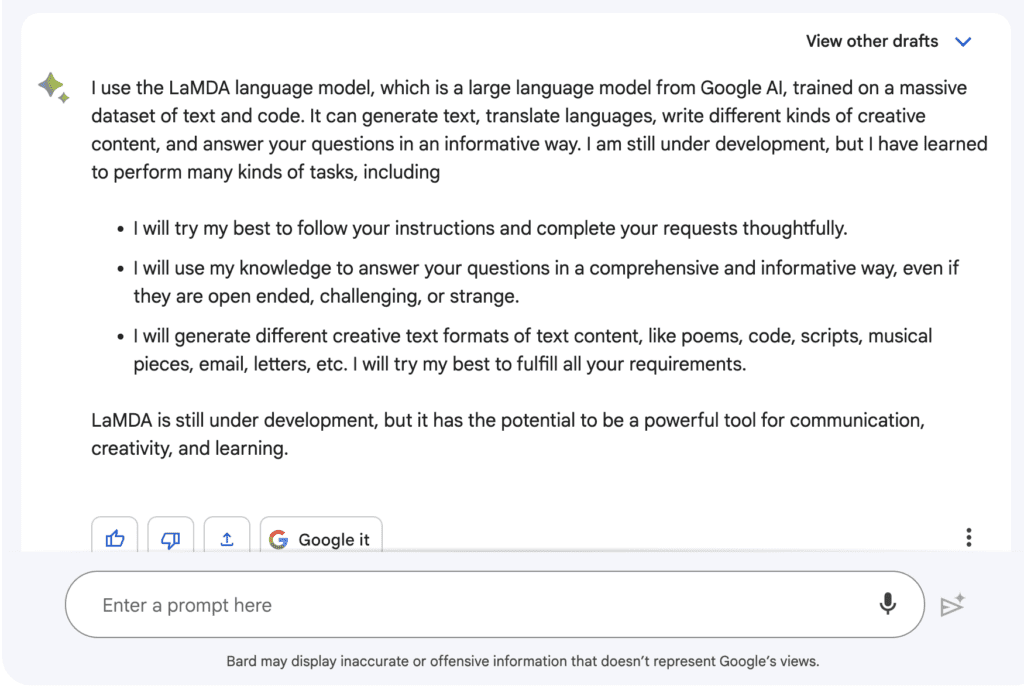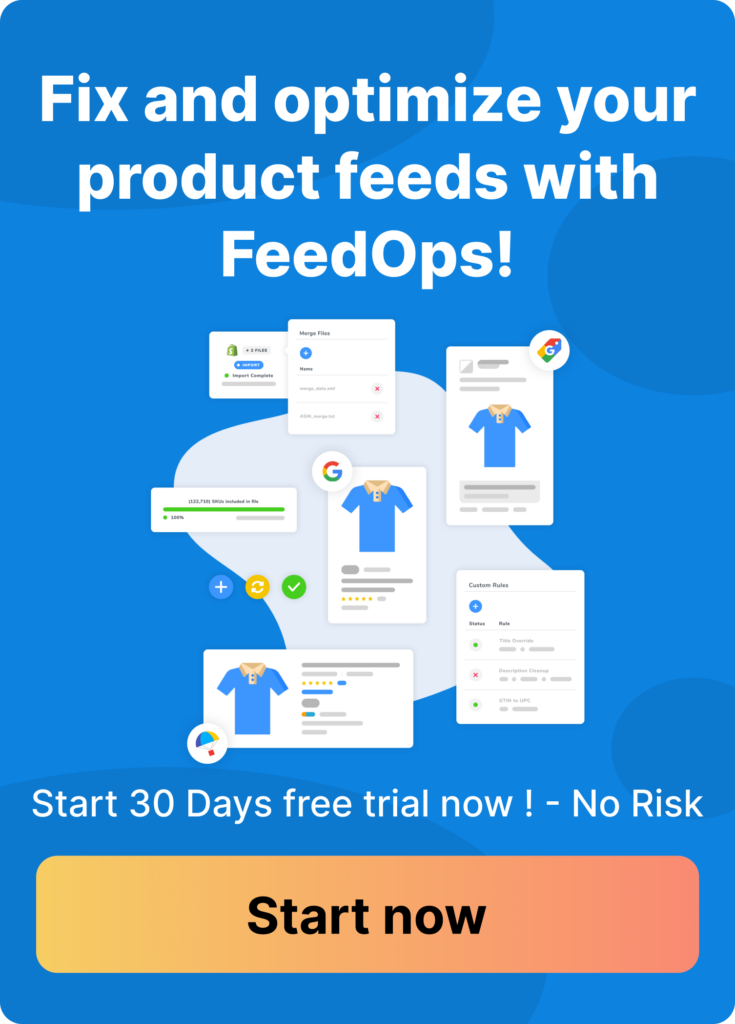Google’s Bard and Bing Chat are at the forefront of a potential revolution in the digital landscape. The integration of conversational AI into search engines could be the most significant evolution since the dawn of the internet, ushering in a new era of interactive, personalized, and intuitive search experiences.
In this promising new era, two contenders are vying for dominance. One is Bard, an innovative conversational AI assistant powered by Google’s LaMDA large language model. On the other side of this digital divide, we have Bing Chat. This experimental conversational AI service, developed by Microsoft, utilizes a proprietary language model, showcasing a different approach to the integration of AI in search.
As we navigate through this showdown of search engine giants, we’ll scrutinize the distinctive capabilities, transparency, creativity, and summarizing skills of both Bard and Bing.
Table of Contents
Introducing Google's Bard: Empowering Conversations and Creativity with an AI Assistant
Bard is not just your ordinary search engine or language model. it’s an innovative conversational AI assistant that takes the power of AI to new heights. Powered by the LaMDA large language model, Bard is designed to generate text, answer questions, translate languages, and even assist in creative endeavors. Its capabilities extend far beyond traditional search engines, making it a valuable tool for learning, creativity, and productivity.
Some cool capabilities:
- Bard can answer a wide range of questions, even those that are challenging or open-ended, providing informative responses based on its extensive knowledge base.
- With Bard, you can explore various creative text formats, such as poems, code, scripts, musical pieces, email drafts, and letters. Unleash your imagination and let Bard assist you in crafting compelling content.
- Bard’s language capabilities extend to translation, allowing you to effortlessly communicate and understand different languages.
- Bard can summarize information found on the internet, providing concise and relevant insights on various topics. (with sources)
Introducing Bing Chat: Unleashing the Potential of Microsoft's Proprietary Conversational AI"
Bing Chat, an innovative conversational AI service, is powered by a proprietary language model developed by Microsoft (Based on Chat GPT and Chat CPT4). This unique platform facilitates human-like interactions with a computer, capable of answering questions, generating text, translating languages, and crafting a myriad of creative content. Although it’s currently in its experimental phase, Bing Chat shows immense promise as a potent instrument for learning, creativity, and productivity enhancement.
Here are the exciting features that Bing Chat brings to the table:
- Bing Chat can respond to your queries in an insightful manner, tackling open-ended, complex, or unusual questions with ease.
- Bing Chat is adept at producing a variety of creative text formats, ranging from poems, code, and scripts to musical pieces, emails, and letters.
- Bing Chat can translate languages, breaking down communication barriers.
- Bing Chat is proficient in summarizing web-based information, providing concise overviews.
- Bing Chat offers relevant links to delve deeper into the subjects you’re interested in.
- Bing Chat facilitates thorough exploration of topics, fostering a deeper understanding.
Round One: Bard or Bing, Which is the Better Trip Planning Assistant?
I have a trip booked later in the year, so I decided to research how to spend the first three days in Amsterdam.
Trip planning with Bard
Bard is lightning-fast and laid out a fantastic itinerary in an easy-to-use and follow format. However, there were no direct links to the information, and the only way to delve deeper was to click a link at the bottom labeled ‘Google It.’ This link conveniently carries the search query to the Google search engine, which at least saves you from having to retype the search. For those who prefer not to type at all, there’s an option to voice your query, which is a handy feature.

Trip planning with Bing
Bing Chat, which also supports voice commands, took a few seconds to respond. It didn’t suggest an itinerary immediately, but it did provide an idea of what there is to do in the city, along with some links to further my knowledge. When you hover over a link, you can see the website it references and an ad (which is beneficial for advertisers). Bing Chat also offered some information about the city, noting its incredible bike-friendliness. Afterward, it posed a clarifying question: ‘Is there anything specific you would like to do or see while in Amsterdam?
After expressing interest in the houseboat, mentioning my wife’s love for antiques and my fondness for wine, Bing Chat continued to pose questions and provide suggestions complete with links and ads. On the one hand, Bing Chat’s informative nature is beneficial when planning a trip, while on the other hand, Bard’s instant itinerary might be handier if you’ve just landed in Amsterdam.
Despite the strengths of both, I have to give this round to Bing. When I asked, ‘How can I spend three days in Amsterdam?’ Bing Chat aided me in refining that question, whereas Google’s Bard immediately supplied a structured, military-style itinerary.
Interestingly, when I specifically asked Bing Chat for an itinerary, it provided one similar to Google’s Bard but with the added suggestion of the houseboat museum.

Round Two: Bing or Bard - Which Assistant is More Transparent?
Transparency is essential when evaluating AI assistants. It encompasses various aspects, including data handling practices, privacy policies, and the disclosure of information. One way to find out about AI assistants’ inner workings is to ask them directly. Here is their response to the question “what language model are you built on?” Bard wins this round.
Bard’s Response

Bing’s Response

Round Three: A Limerick-Infused Exploration of Creativity in Bard and Bing
Now who doesn’t love a good limerick? In this round, we delve into the realm of creativity by putting Bard and Bing to the test with a limerick challenge. Limericks are known for their clear structure, consisting of five lines with the rhyme scheme AABBA (the first, second, and fifth lines rhyme with each other, while the third and fourth lines rhyme with each other). We’ll see which chat assistant rises to the occasion and crafts the most delightful limerick about ale and a poodle. Let the limerick battle commence
Bing
- There once was a poodle named Dale (A)
- Who loved to drink ale from a pail (A)
- He’d lap it up quick (B)
- And then do a trick (B)
- While wagging his curly tail (A)
Bard
- There once was a poodle named Sue (A)
- Who loved to drink ale with a view (A)
- She’d sit by the fire (B)
- With a smile on her face (FAIL)
- And a poodle-sized glass full of brew (A)
Bing’s limerick maintains the correct AABBA rhyme scheme throughout, with consistent rhyming patterns in lines 1, 2, and 5 (Dale, pail, and tail). The limerick is coherent and follows the structure expected from a limerick.
On the other hand, Bard’s limerick encounters a deviation from the rhyme scheme in line 4, where the word “face” does not rhyme with the expected B rhyming sound. This deviation makes Bard’s limerick less consistent and detracts from the overall quality of the poem.
Therefore, based on adherence to the rhyme scheme and overall coherence, Bing’s limerick is considered better in this comparison.
And the winner is...
At this stage, there’s no clear leader, though Bing seems to be leading the race. Bing Chat’s integration into search provides clear advantages to users, making website links and references easy to find. On the other hand, Bard doesn’t perform as well in this area. True to Google’s form, Bard operates at lightning speed.
This competition is nothing but good news for users of these services, but it once again challenges advertisers to rethink their strategies in the evolving world of natural language marketing. Our approaches to SEO and ecommerce advertising will need to evolve accordingly. Once again, happy marketing!



